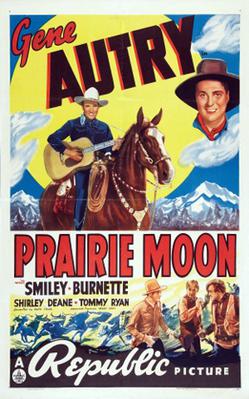Plot
Following a shootout with lawmen, cattle rustler Jim "Legs" Barton with his dying words makes the local sheriff and childhood friend, Gene Autry, promise to take care of things for him after he's gone. The next day, Barton's attorney, Arthur Dean, informs Gene that, as executor of the estate, he must look after Barton's three motherless boys. Gene sends his sidekick Frog Milhouse to Chicago to bring the children back, and then prepares the ranch for their homecoming, with the help of Peggy Shaw, the local schoolteacher. In Chicago, Frog locates the feisty boys, William "Brain", Clarence "Nails", and Hector "Slick" Barton, who are more than Frog can handle.
The boys have trouble adjusting to Western life on the ranch and long to return to the city. While they spy on Gene as he proposes to Peggy at a barn dance, general store owner Frank Welch, Legs's secret partner, leads a cattle rustling raid. The local ranchers chase after the rustlers, but the cattle seem to vanish. The ranchers do not suspect Welch, but when the boys see him riding out from behind a waterfall on their ranch, they realize what has happened. Welch tries to befriend them, saying that their father was his good friend. When the boys tell him about Gene's plan to adopt them, Welch comes up with his own plan.
At the adoption hearing, Welch and his wife offer to adopt the Barton boys. Gene agrees to the offer because he is unmarried and the boys say the want to go with Welch. Sometime late, one of the boys has a change of heart, and when he tells Gene what has happened, Gene produces a phony "Mrs. Barton" and her three children. The judge then rules that Brain, Nails, and Slick are imposters, but Welch detects that the plan is a trick. He plans to do away with the boys and secretly remove the rustled cattle from their ranch. Gene intervenes, however, and Welch and his gang are captured. Afterwards, Gene and Peggy plan to marry and adopt the boys, despite Frog's concern that they will be getting more than they bargained for.
This page is based on this
Wikipedia article Text is available under the
CC BY-SA 4.0 license; additional terms may apply.
Images, videos and audio are available under their respective licenses.
